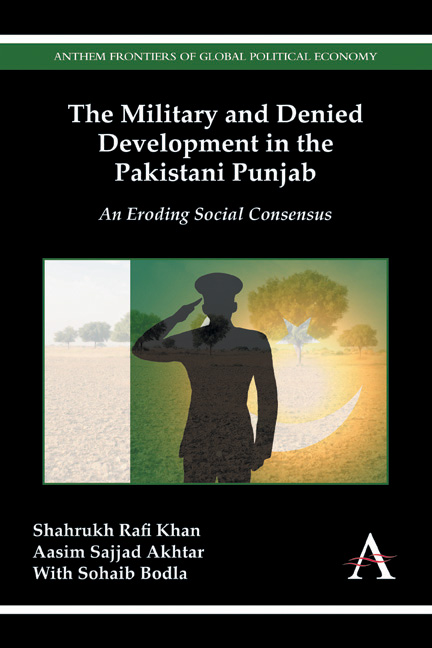Book contents
- Frontmatter
- Dedication
- CONTENTS
- Acknowledgments
- Abbreviations
- Preface
- Chapter One The Military and Economic Development in Pakistan
- Chapter Two Punjab's State–Society Consensus on the Military's Dominance and Economic Role
- Chapter Three Research Design, Method, Institutional Issues and Scope of the Military's Land Acquisitions
- Chapter Four The Military's Agrarian Land Acquisitions: High Handedness and Social Resentment
- Chapter Five From Social Resentment to Social Resistance
- Chapter Six Bahria Town: A Military-Related Real Estate Venture
- Chapter Seven The Military as Landlord in the Pakistani Punjab: Case Study of the Okara Farms
- Chapter Eight Guardians No More? The Breakdown of the Consensus
- Glossary
- Index
Chapter Seven - The Military as Landlord in the Pakistani Punjab: Case Study of the Okara Farms
Published online by Cambridge University Press: 05 December 2014
- Frontmatter
- Dedication
- CONTENTS
- Acknowledgments
- Abbreviations
- Preface
- Chapter One The Military and Economic Development in Pakistan
- Chapter Two Punjab's State–Society Consensus on the Military's Dominance and Economic Role
- Chapter Three Research Design, Method, Institutional Issues and Scope of the Military's Land Acquisitions
- Chapter Four The Military's Agrarian Land Acquisitions: High Handedness and Social Resentment
- Chapter Five From Social Resentment to Social Resistance
- Chapter Six Bahria Town: A Military-Related Real Estate Venture
- Chapter Seven The Military as Landlord in the Pakistani Punjab: Case Study of the Okara Farms
- Chapter Eight Guardians No More? The Breakdown of the Consensus
- Glossary
- Index
Summary
Introduction
Chapter 4 identified palpable social resentment, and chapter 5 highlighted several incidences of social resistance to the military's predatory behavior in the Punjab. The peasant struggle against the military as landlords at the Okara farms has so far garnered the most media and public attention in Pakistan. We explore this case study of social resentment and resistance to the military as landlord in the Punjab, and cast it in the broader context of peasant resistance as a conceptual framework. While some of the historical background of the canal colonies was covered in chapter 2, the specific evolution of the Okara Military Farms in that context is covered below to ensure the case study is self-contained. This enables us to connect this last chapter before the summary with the historical and state theory issues raised as the broad conceptual framework for this book in chapter 2. Tenure relations in the canal colonies and military farms are covered next, with a focus on how contract changes initiated by the military triggered social mobilization. The last sections deal with the actual dispute and peasant revolt.
Conceptual Framework
The wave of peasant studies that proliferated through the 1970s threw up many debates that remain unconcluded and demand further investigation. Among the reasons for this was that such debates simply went out of academic fashion (Shanin 1989). It can also be argued that after the collapse of communism in 1989, radical scholarship in general, and leftist political analysis in particular, experienced a distinct decline, one that undermined peasant studies as well as many other traditions of critical inquiry. A decade and a half after the end of the Cold War, radical critiques of capitalist modernity (Berger 1992; Petras and Veltmeyer 2001, 2003) and its effects on the peasantry are as relevant as they ever have been. Indeed, farmers still comprise over half of humanity, and in one form or another remain the central component of mass protest movements – not just in so-called Third World nations (Brass 1995; Bianco 2001; Washbrook 2007), but also in metropolitan capitalist countries (Bové and Dufour 2001).
- Type
- Chapter
- Information
- The Military and Denied Development in the Pakistani PunjabAn Eroding Social Consensus, pp. 105 - 128Publisher: Anthem PressPrint publication year: 2014



